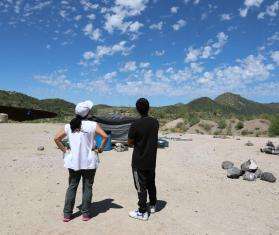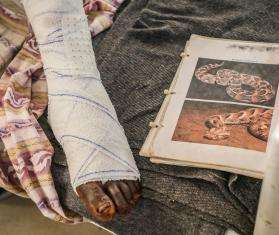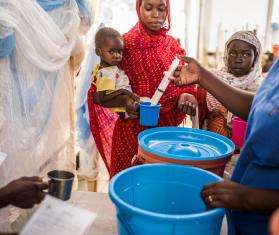During mass casualty incidents, you stand there [the emergency room], in a puddle of blood and a crowd of people. It's loud, and you can really smell the blood all around. Crowds of people are trying to come in, while the security guards are doing their best to keep relatives and loved ones out, so not to overcrowd the hospital.
At Nasser Hospital, MSF provides surgical, trauma, and burn care to patients. On Saturday July 13, we received hundreds of injured, as well as people who had been killed, by an Israeli strike in nearby Al-Mawasi. The attack hit an area where Israeli forces had repeatedly advised displaced people to go. We first understood something bad had happened from the enormous explosions that were closer to the hospital than ever before. Almost immediately after, we heard the ambulances.
Chaos soon ensued at the hospital. Our team ran to the emergency room to receive those in need of medical care. One of the patients, a 3-year-old, was injured. Her parents were standing right next to her, worried, as she looked directly at me. She was breathing, so she must be okay, I thought. But as I took her bandage off, I realized her entire left thigh was peeled down to the bone.
I turned to the next patient: a woman covered in dust. As I approached her, she looked up at me and I tried to smile and engage with her. She was breathing normally—her eyes were open, I couldn’t see blood anywhere. But as I took down the bandage, a large piece of her bowel came out. How is it even possible that she is looking at me, I thought.
Seconds later, the doors to the emergency room crashed open. Four or five injured people came in, some of them first-aid responders. Among them was a boy who wasn’t breathing. We tried to revive him, but the nurse looked at us and asked, “Why are we responding if he can’t breathe? We have to save other lives.” It is standard practice while triaging to consider those who can’t breathe unable to save. No one had the heart to call it. He was someone’s child. But we had to move on to the next, and then the next, and this continued for another four and a half hours.
In the emergency department, there was blood everywhere on the floor and I had to kneel to see the patients on the floor. Patients were sprawled everywhere, because there were no beds left. I could feel my knees getting wet from the blood. At the same time, more and more patients were coming in.
I've worked in mass casualties around the world and the smell of blood is the same wherever you are. But here in Gaza, the horror really hits home. In the middle of our work, we saw our colleague, an MSF anesthetist in the emergency room. I asked him what he was doing there and why he wasn’t in the operating room. “I’ve just heard my house has been destroyed, and my daughter and nephew are in here somewhere,” he said.
Later, we found out that his nephew was killed. Our colleagues are all directly affected by the violence and displacement. You don’t have time to process it.
Four days later, we faced another mass casualty incident at the hospital. It seems to never end. Our Palestinian medical staff are still here, trying to stop patients from bleeding, fix their broken arms, provide surgical care—but we keep on losing patients. They have been living through this for nine months, working while they hear news about their loved ones being killed. Exhausted and traumatized don’t begin to cover the loss they continue to face.
We are just waiting for the next mass casualty incident. Nowhere is safe.




